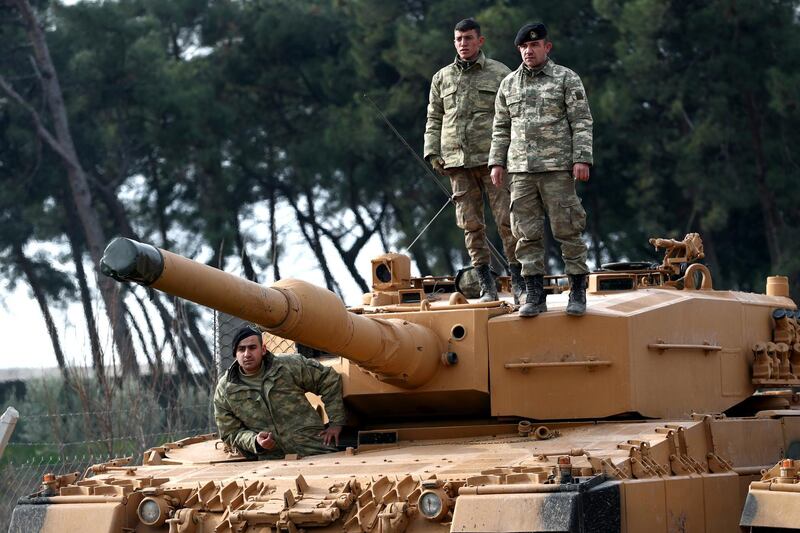Syrian militias and Turkish special forces said on Sunday that they have captured villages inside the Kurdish-controlled enclave of Afrin.
In response, the Kurdish militia known as the YPG struck the towns of Killis and Reyhanli in southern Turkey with rocket fire on Sunday, killing a Syrian refugee.
State Department spokesperson Heather Nauert said the US was concerned about "the plight of innocent civilians who are now faced with an escalation in fighting". In a statement released on Sunday Ms Nauert urged Turkey to "exercise restraint and ensure that its military operations remain limited in scope and duration and scrupulous to avoid civilians casualties".
Turkish officials have dubbed the offensive “Operation Olive Branch” and said that their intention is to create a 30 kilometre “safe zone” inside Syria.
“We are advancing with support from Turkish special forces,” said Muataz Raslan, an officer in Jaish Al Nukhba, a rebel group that is part of the Euphrates Shield, an umbrella of Turkish-supported Syrian rebel factions aligned with the Free Syrian Army (FSA).
Mr Raslan said his group had captured three villages on Sunday. Other groups reported similar gains in what was described as a three-pronged assault on Afrin.
In its second day, #OliveBranchOperation continues to ensure peace and security for our people, protect Syria’s territorial integrity and eliminate all terrorist elements in the region. Turkey expects its allies to support its fight against terrorism in all of its forms.
— Ibrahim Kalin (@ikalin1) January 21, 2018
The YPG has links to the Kurdistan Workers' Party, or PKK, a Turkish Kurdish separatist group that has fought the Turkish government since the 1980s. Turkey considers the PKK and the YPG terrorists.
The YPG took control of Afrin and other parts of northern Syria as the Syrian government shifted its military resources to other parts of the country to fight rebels seeking the overthrow president Bashar Al Assad.
The YPG also makes up the core of the US-backed Syrian Democratic Forces (SDF), which helped drive ISIL from territory in northern and eastern Syria last year. The US has soldiers in Syria to the east of the Euphrates River in support of the SDF, and is continuing to provide the group with training and weapons.
Mr Erdogan has vowed to clear Syria's Kurdish militias from Afrin in the west all the way east to the Iraq-Syria border. A move that could bring him into direct conflict with US troops.
Meanwhile, he has signaled that the next objective after Afrin would be the SDF-controlled town of Manbij, the only other part of YPG/SDF territory besides Afrin that lies west of the Euphrates.
Turkey and the forces it backs are likely to face stiff resistance from the YPG in Afrin.
Mr Raslan said his forces have been told the YPG has an estimated 8,000 fighters in the area and the Associated Press reported on Sunday that the YPG was receiving reinforcements from other parts of Syria. FSA groups accused the Syrian government of facilitating the movement of YPG troops from other parts of Syria to Afrin.
Approximately 13,000 Free Syrian Army fighters were taking part in the operation, Mr Raslan said.
The intensifying fighting prompted the French foreign ministry to call for an emergency meeting of the UN security council.
_______________
Read more:
Syrian war reaches Britain as volunteers, not soldiers, die fighting ISIL
Turkish war planes launch air strikes against Kurds in Afrin
Turkey seeks Russian approval for air campaign against Afrin
_______________
The ministry said in a written statement that French foreign minister Jean-Yves Le Drian spoke to his Turkish counterpart, Mevlut Cavusoglu, by phone Sunday.
France urged Turkish authorities "to act with restraint in a context where the humanitarian situation is deteriorating in several regions of Syria".
In Turkey, which has a significant Kurdish population, at least one political party called for demonstrations against Turkey's military’s actions. President Recep Tayyip Erdogan said that anyone who chose to demonstrate would "pay a high price."
"This is a national struggle. We will crush anyone who opposes our national struggle," Mr Erdogan said.
Mr Erdogan said Afrin was a predominantly Arab area and that Turkey was determined to return it to its rightful owners.
One FSA fighter, however, said that he didn’t even know the names of the villages his troops had captured on Sunday, suggesting Kurds might also have a claim to the area.
Mr Erdogan vowed to defeat the Syrian Kurdish group, warning the YPG not to rely on weapons supplied by the United States.
Many of the FSA groups receiving Turkish backing were also former recipients of American financial support in their campaign to overthrow Mr Al Assad.
France also condemned the "indiscriminate bombings" targeting inhabited areas and medical centers led by the Syrian government in the northwestern province of Idlib in recent weeks.
The Syrian government began an offensive in Idlib last month, displacing more than 200,000 people since December 15, according to the United Nations High Commissioner for Human Rights.
Idlib province is the last province in Syria that is largely controlled by rebel factions.






